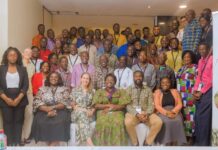The Chamber of Agribusiness Ghana, in solidarity with its continental and global partners, celebrates the distinguished appointment of His Excellency MOSES VILAKATI as the African Union Commissioner for Agriculture, Rural Development, Blue Economy, and Sustainable Environment.
His visionary leadership, honed over three decades of transformative work in agricultural policy, environmental stewardship, and rural empowerment in Eswatini and across Southern Africa, inspires confidence in Africa’s journey toward food sovereignty and sustainable prosperity.
A Vision Aligned with Africa’s Potential:
Hon. Vilakati clarion call to harness technology, innovation, and intra-African collaboration to unlock the continent’s agricultural potential could not be timelier.
Africa, endowed with 65% of the world’s uncultivated arable land, 10% of global freshwater resources, and a dynamic youth population, remains paradoxically reliant on $100 billion in annual food imports.
His vision to bridge this gap—through mechanization, agro-industrialization, and climate-resilient value chains—echoes the aspirations of 1.4 billion Africans.
We applaud your commitment to aligning the Comprehensive Africa Agriculture Development Programme (CAADP) with the African Continental Free Trade Area (AfCFTA), ensuring that “growing what we eat” translates into economic empowerment for farmers and agribusinesses.
Continental Challenges in a Global Context:
Africa’s agricultural transformation unfolds against a backdrop of intersecting global and regional crises:
Global Climate Vulnerability & USAID Funding Withdrawal –
Deepening Africa’s Agricultural Crisis –
The Trump administration’s abrupt freeze of USAID funding has exacerbated Africa’s climate vulnerability, creating critical gaps in agricultural support at a time when the continent faces intensifying droughts, floods, and food insecurity. USAID’s FY2023 budget allocated $1.3 billion to agriculture globally, with sub-Saharan Africa relying heavily on these funds for climate-resilient farming, seed distribution, and irrigation projects.
The suspension has halted programs like Haiti’s bean seed distribution (3.9 metric tons now rotting in storage), threatening planting seasons and worsening food insecurity.
In South Sudan, where catastrophic floods destroyed crops, USAID-funded food deliveries were abruptly paused, forcing families like James Akot’s to sell livestock for survival—a short-term fix that risks long-term destitution .
Similarly, Sudan’s famine response collapsed as communal kitchens, which fed 816,000 people, closed due to funding cuts, accelerating starvation in war-torn regions .
Economically, seven African nations—including DR Congo and Uganda—face a 3% GDP shock due to USAID’s freeze, with agricultural and emergency aid accounting for 11% of their gross national income .
This disruption undermines climate adaptation efforts, such as drought-resistant crop initiatives and soil health programs, leaving farmers unprepared for recurring climate shocks .
The withdrawal also stalls continental strategies like the AU’s Comprehensive Africa Agriculture Development Programme (CAADP), which depends on blended financing now jeopardized by shrinking global aid.
Without urgent alternatives, Africa’s dual crises of climate vulnerability and agricultural underfunding threaten to unravel decades of progress, demanding systemic reforms and renewed international solidarity.
Climate Vulnerability – With 7 of the 10 most climate-vulnerable nations in Africa, erratic weather patterns threaten 60% of the continent’s smallholder farmers, as seen in Ghana’s recent 30% decline in maize yields due to droughts.
Geopolitical Pressures – The ripple effects of the Russia-Ukraine war disrupted Africa’s access to fertilizers and wheat, exposing overreliance on volatile global markets.
Funding Gaps – Despite the 2014 Malabo Declaration’s pledge to allocate 10% of national budgets to agriculture, only 5 countries met this target in 2023, compounded by shrinking global aid for agriculture, which fell by 12% since 2020 (OECD 2024).
Policy Fragmentation -Harmonizing 55 national agricultural policies under CAADP remains a herculean task, requiring bold diplomacy and innovative governance frameworks.
Yet, these challenges are matched by unprecedented opportunities. The global shift toward sustainable food systems, digital disruption in agri-tech, and Africa’s youth-driven entrepreneurial revolution position the continent to leapfrog outdated models and lead a 21st-century agricultural renaissance.
A Pledge of Continental & Global Partnership:
Your Excellency, the Chamber of Agribusiness Ghana, alongside our global and continental partners in the Alliance with other progressive Initiatives, pledges unwavering support for your tenure.
We commit to:
Amplify Technology Transfer – Scale up innovative National digital platforms for farmer advisories and connect them to pan-African networks like AgraWatch for real-time climate data sharing.
Advocate for Fair Global Trade – Mobilize African agribusiness leaders to lobby at the WTO for equitable trade terms that protect local markets while expanding exports under AfCFTA’s Guided Trade Initiative.
Unlock Sustainable Finance – Partner with the African Development Bank (AfDB) and global institutions to pilot blended-finance models, reducing interest rates for smallholders and incentivizing youth-led agri-tech startups.
Strengthen South-South Collaboration – Facilitate knowledge exchange between Africa and Global South innovators, such as India’s digital soil health cards and Brazil’s Embrapa tropical agricultural research.
A Future Built on Resilience & Innovation – Your leadership arrives at a pivotal juncture. As Africa grapples with the dual imperatives of feeding its population—projected to reach 2.5 billion by 2050—and mitigating climate risks, your focus on sustainable intensification, blue economy development, and circular agri-business models offers a roadmap to resilience.
The Chamber stands ready to support your flagship initiatives, from scaling solar-powered irrigation to mainstreaming biofortified crops, ensuring no community is left behind.
Your Excellency, as you assume this critical role, know that Africa’s agribusiness community marches with you.
Together, we shall transform challenges into stepping stones, proving that a continent which feeds itself can truly shape its destiny.
In solidarity and shared purpose…
Farmer Anthony Morrison, Chief Executive Officer, Chamber of Agribusiness Ghana
Continental Agribusiness National Policy Investments Prioritization Expert Panelist(AUDA- NEPAD)
Member – Post Malabo Technical Working Group (5) – AKADEMIYA2063
Chair, West Africa Agribusiness Interest Group
Alliance of Africa Agribusiness Interest Group








